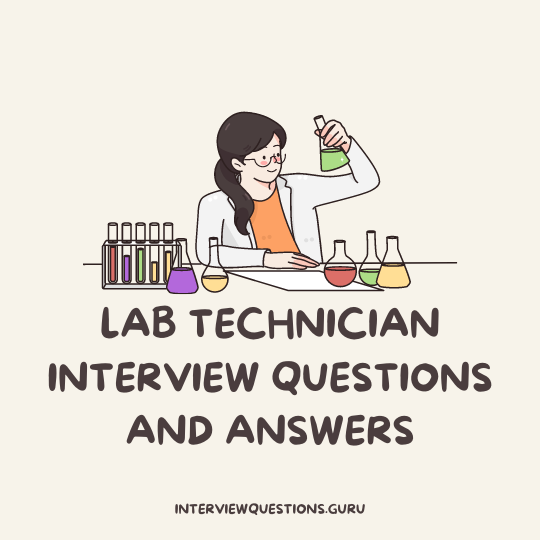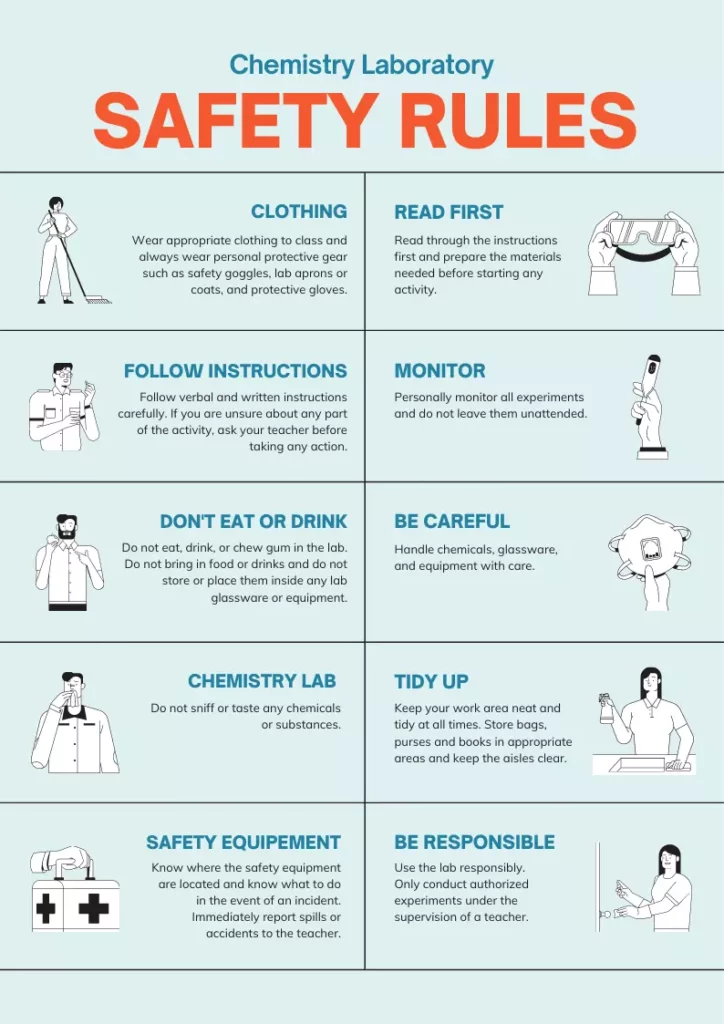What are some of the best lab technician interview questions? Before we discuss that let’s first understand why the role of a lab technician is?

As a lab technician, you will play an important role in supporting scientific research. You will be responsible for the set-up, maintenance, and operation of laboratory equipment and performing various experiments and tests. To be successful in this role, you must have strong analytical and problem-solving skills.
You should also be able to work independently and follow instructions carefully. During an interview for a lab technician position, you may be asked various questions about your qualifications and experience. Here are some sample lab technician interview questions that you may be asked:
Table of Contents
Lab Technician Interview Questions and Answers
What is your experience with HPLC?
This question will assess your experience and qualifications using a specific type of scientific equipment. In your answer, share any relevant experience you have working with HPLC. If you do not have direct experience, explain any training or coursework you have completed that would help you be successful in this role.
Example: “I have experience working with HPLC from my previous role in a chemistry lab. I am also familiar with the software often used for data analysis. I am confident that I can operate this equipment and troubleshoot any issues that may arise.”
What would you do if you noticed a colleague was not following safety protocol?
Working in a laboratory can be dangerous if proper safety protocol is not followed. This question assesses your ability to identify and address safety concerns in the workplace. In your answer, share how you would handle this situation if you noticed a colleague not following safety protocol.
Example: “If I noticed a colleague was not following safety protocol, I would first talk to them privately about my concerns. If they did not listen or take my concerns seriously, I would speak to our supervisor. It is important to follow safety protocol in the laboratory to avoid accidents or injuries.”
What is your experience with data analysis?
In many laboratories, data analysis is an important part of the work done. This question assesses your experience and qualifications in this area. In your answer, share any relevant experience you have working with data analysis. If you do not have direct experience, explain any training or coursework you have completed that would help you be successful in this role.
Example: “I have experience working with data analysis from my previous role in a chemistry lab. I am also familiar with the software often used for data analysis. I am confident that I can operate this equipment and troubleshoot any issues that may arise.”
What led you to pursue a career as a lab technician?
This question allows you to share your motivations for pursuing a career as a lab technician. In your answer, share what interests you about this field and why you think you would be successful in this role.
I have always been interested in science, and I enjoy working with my hands. When I was looking for a career that would combine these two interests, lab technician seemed like the perfect fit. I also wanted to work in a field where I could help people, and I knew that lab technicians play an important role in the healthcare system.
What is your greatest strength as a lab technician?
This question allows you to share what you believe to be your greatest strength as a lab technician. In your answer, explain why you believe this to be your strength and give an example of when you demonstrated this strength.
I would say my greatest strength is my attention to detail. To be successful in this field, it is important to pay close attention to instructions and be precise in your work. I have always been good at paying attention to detail, and I know that this strength has helped me succeed in my career as a lab technician.
What are some best practices for storing laboratory samples?
This question assesses your knowledge of how to store laboratory samples properly. This is important to maintain the samples’ integrity and ensure that they are not contaminated. In your answer, share at least three best practices for storing laboratory samples.
Example: “It is important to store laboratory samples in a clean and dry environment. Samples should also be labeled so that they can be easily identified. When storing samples for long periods, it is important to check on them regularly to ensure they have not been contaminated.”
Questions about your previous lab experience
- Tell me about your previous lab experience.
- What was your job?
- What was your role?
- What were your responsibilities?
- What results did you achieve?
- What did you like about the lab?
- What did you dislike about the lab?
- Tell me about an interesting experiment that you worked on?
- What was the most challenging experiment that you worked on?
Questions about your qualifications
- What made you want to become a lab technician?
- What qualifications do you have?
- How did you go about obtaining your qualifications?
- Do you think that your qualifications are adequate for the job?
Questions about your analytical and problem-solving skills
- What do you think are the most important skills for a lab technician?
- Can you give me an example of when you had to use your analytical skills in the lab?
- Can you give me an example of when you had to solve a problem in the lab?
Questions about your ability to work independently
- Can you give me an example of when you had to work independently in the lab?
- What do you do if you can’t find the answer to a problem?
Technically-orientated questions
- What do you know about lab processes and procedures?
- How much knowledge do you have regarding safety standards, regulations, and protocols?
- How would you define “quality control” for laboratory work?
- Tell me about a time you had a conflict with another member of your laboratory team. What did you do to resolve it?
- How would you respond if someone asked why you cleaned the lab when there are other things to do?
- Tell me about a time you had to take on an unpleasant task. How did you approach it?
- What do you think are the main responsibilities of a lab technician?
- Are there any skills you’re missing that will make your job as a lab technician difficult or impossible? If so, what can be done to address these gaps in skill?
- What do you know about our company, and what makes us unique in the industry?
How to prepare for the lab technician interview
- Research the company in advance, so you have some knowledge of what they do, their mission statement, and their goals.
- Please read the job description carefully, and think about how your qualifications align with it.
- It will also be helpful to think of examples from your previous experience that demonstrates why you’re a good fit for this role. For example: “a time when I demonstrated leadership skills was….”.
- You could also make relevant examples up by thinking about what you enjoy doing most and find easiest at work, and try to come up with an example based on those things. For example – *”I’m highly organized and love working in teams, so I’m always looking for ways to improve processes within my team.”*. If something specific to this role requires teamwork or organization, think of something there too.
- Know your CV inside out to answer any questions regarding previous roles/projects etc. For example: if you did some freelance work during University, they might ask why/how/when did this happen? What did it involve? Did it develop any skills? What was your biggest achievement?
- Get a good night’s sleep the night before; this will help you stay alert and calm during an interview.
- Arrive early, but not too much earlier than the scheduled time.
- Dress appropriately; try to look professional while still staying comfortable.
- Be honest and straightforward when you answer questions; don’t try to downplay your flaws or exaggerate your strengths.
- Stay positive! And most importantly, smile often.
